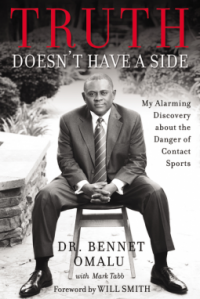

When Dr. Omalu discovered a connection between head injuries and cognitive dysfunction, he thought the sports industry would welcome his findings. Instead, this gentle man of faith became the subject of a controversy that threatened his career, his family, and his right to live in the United States. In Truth Doesn't Have A Side, the doctor who inspired the movie Concussion shares insights that will change how you view your family's involvement in contact sports. This is a riveting story of finding new life in America, new strength within the heart, and renewed faith in God's call to speak the truth no matter what.
~ from back cover
The book Concussion by Jeanne Marie Laskas (the basis for the movie by the same name starring Will Smith) explored the topic of "mild" brain trauma within the NFL and Dr. Bennet Omalu's role in bringing the dangers of brain trauma in athletes to light. In Laskas' book, we got to know a bit of Omalu's personal story. In Truth Doesn't Have A Side, readers get the expanded version (though, in all honesty, the bulk of the first 65 pages or so of material in Truth are pretty well covered in the Concussion book).
Yes, he does talk about his discovery of and work with CTE cases, but the majority of this book focuses on the years prior to his time in the spotlight -- the journey from a small community in Nigeria, through years of red tape and racial prejudice to finally finding a new place to set roots in the United States. What a journey it's been for this man!
In his own words, Omalu discusses his family history, the good and the bad. The story of Omalu's father is particularly harrowing: Omalu's father and aunt were abandoned by their mother after her husband's supsicious death, leaving them to survive as street children until a visiting missionary was able to arrange housing for them. Unfortunately, it didn't pan out well -- Omalu's father was beaten, often starved, treated as a servant, but endured it because the family did provide him with schooling. The way Omalu tells it has an almost biblical tale kind of ring to it!
During the Nigerian Civil War (aka Biafran War), the time during which Omalu himself was born, his father's accomplishments -- college degree, years of dedicated employment as a civil servant -- were minimalized to "You're Igbo", forcing the entire family to have to relocate to a refugee camp for the duration of the war. The crazy thing is Omalu's father STILL worked as a government employee while they forced him to live in a refugee camp!
My father's name was Amaechi, which means, "I may be down today, but no one knows what tomorrow may bring!"
~ Bennet Omalu
As mentioned a bit in Concussion, Omalu explains how medicine was actually not a natural calling to him. His true dream was to become an airline pilot, but since his parents had their hopes set on him studying medicine, that's what he went with (though he does admit that science DOES feed his natural curiosity quite nicely). Imagine where the medical community would be had he take the "I do what I want!" stance. Truthfully, it made me a little sad for him that he didn't feel the freedom of choice to pursue his heart's desire, but I applaud his commitment to fully dedicate himself to his field regardless, as his work has opened the way to research that is on its way to helping so many in future generations.
Omalu describes the journey of how he came to have SO many degrees and certifications, the process of earning medical degrees in both Nigeria and the US. Through it all, he reveals his struggles with deep depression, racial prejudice in his new American community once arriving here in 1994, and the frustration of having certain people wanting to bar his progress every step of the way. It certainly seemed like an act of God that he managed to get a medical degree here at all.
The CTE material, Mike Webster case that started it all, all of that... actually takes up only a small portion of this book. The book in its entirety is not a long read, less than 300 pages total. The bulk of his discussion on his CTE years starts in Chapter 11 (approx. 120 pgs in, hardcover ed.).
For those interested in behind-the-scenes movie facts and trivia, Omalu also dishes on his very first meeting with Will Smith, who was chosen to portray Omalu in the film Concussion, how Smith originally wasn't interested but once a friendship developed between the to, he was quickly and happily immersed in the role.
Omalu tells a powerful story, but it was sometimes hard to follow, as he would jump back and forth between his days as a medical examiner in Pittsburgh and his time as an ER doctor in Nigeria... with little to no transition or chronological explanation in between. I will say though, Omalu closes on a wonderful prayer for the future that left me quite moved.
Following the close of his story, Omalu offers parents a Q & A guide on the topic of sports and head trauma, should their children want to play contact sports. He strongly urges readers to keep their kids out of such sports altogether, but admits that if you choose to go forth with sports anyway, it's best to at least go in informed.
FTC Disclaimer: BookLookBloggers.com and Zondervan Publishing kindly provided me with a complimentary copy of this book in exchange for an honest review. The opinions above are entirely my own.

 1
1








